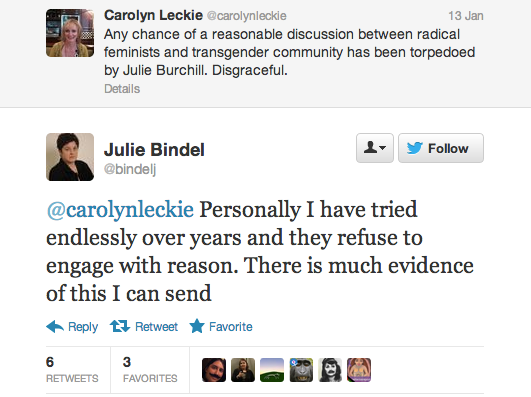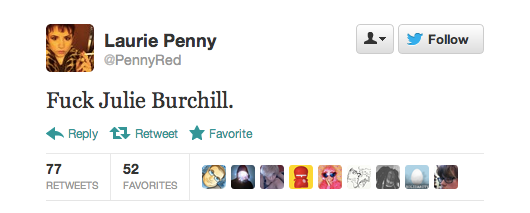On Tuesday of last week, left-wing British columnist Suzanne Moore wrote an article in the New Statesman that has sparked debate about transphobia in the feminist press, inspired an uprising of Twitter anger and hate mail, and eventually led Moore to delete her Twitter account entirely.
While the original article was about the hardships faced by women during the economic recession, the part that inspired such anger was a remark about women being expected to have the body of “a Brazilian transsexual.”
Supporters of trans rights were quick to Tweet their discomfort at this phrase, and Jane Carnall at lgbt.co.uk (while describing the original column as “mostly great”), pointed out that Moore’s words were poorly chosen in the light of the high murder statistics for trans people in Brazil. Rather than posting a retraction, Moore doubled down, answering flippantly and finally tweeting, “People can just fuck off really. Cut their dicks off and be more feminist than me. Good for them.”
In response to criticism that her Tweets were transphobic, Moore’s column in The Guardian the next day tried to bring the discussion round to her original topic of vulnerable people faring badly during the recession, but to no avail. By ignoring the concerns of trans people and online social justice activists, she had incensed a significant number of her own readers.
This reaction from both consumers and writers of feminist commentary is just one in a long string of arguments, both online and off, about the concept of intersectionality. In this context, intersectionality refers to the links between differing groups of people who suffer from bigotry or oppression, and the theory that all methods of oppression must be fought rather than each being dealt with as a separate entity. Moore’s comments run on a theme often put forward by other social justice advocates: that one aspect of social justice (in this case, the economic oppression of women) is more important than another.
High-profile left-wing feminists quickly closed ranks. Author and journalist Julie Burchill writing a column in The Observer titled “Transsexuals should cut it out.” Unsurprisingly, this only served to fan the flames:
To have your cock cut off and then plead special privileges as women—above natural-born women, who don’t know the meaning of suffering, apparently—is a bit like the old definition of chutzpah: the boy who killed his parents and then asked the jury for clemency on the grounds he was an orphan.
At current count, Burchill’s article is the most-read page of the day on the joint Guardian–Observer homepage, and 20 pages of comments have been left by readers from both sides of the argument. Even more significantly, enough complaints have been sent to the Observer website that editor John Mulholland was forced to weigh in, tweeting that the Reader’s Editor would provide a response to the 2,000-plus comments like votesaxon‘s:
I am a woman, working class and a feminist. You do not speak for all “natural-born women”. You do not speak for me. You use the language of a bigot when you speak about the trans lobby. What is next, an article about the gay agenda? I have been a feminist for as long as I can remember and this is the first time I feel ashamed of that. You do not speak for all of us.
With this comment already boasting almost 2,000 upvotes from other readers, while many mainstream feminist writers continue to throw in their support with Burchill and Moore, it is clear that this is one of the most divisive social justice issues of the moment. Journalist and women’s rights activist Julie Bindel, who in the past has come under fire for her opinions on trans issues, also tweeted her support of Moore and Burchill’s articles, saying,

But while the old guard of British feminist polemicists continue to rail against the replies from online social justice and trans rights advocates, popular left-wing reporter Laurie Penny (@pennyred, whose tweets on feminism, LGBT issues, and the Occupy movement are read daily by over 56,000 followers), announced in no uncertain terms:

This tweet succinctly represents the opinions of the social justice community on Tumblr, whose reactions on the tags for Suzanne Moore and Julie Burchill are almost uniformly enraged. Posts and reblogs with titles like “All women are equal but some are Moore equal than others” and “I wish Suzanne Moore would just stop digging” are all that one finds relating to these two writers.
The readers of Tumblr social justice posts typically skew younger than the average age of Observer or New Statesman readers, possibly indicating an age gap as well as a divide in opinion between social justice advocates who primarily operate online, and those who originate from the generation of print journalism.
While Moore, Burchill, et al. continue to publish diatribes against “the vociferous transsexual lobby” of Twitter critics and social justice bloggers, their online counterparts largely seem to be in favour of discussing intersectionality as a fact of life rather than an extremist theory. Along with multiple Tumblr posts urging people to send complaints to the Guardian-Observer and New Statesman, an online petition has been set up to persuade the Guardian-Observer to publish an apology—and has already been signed by over 3,000 people in less than a day.
As of today, Julie Burchill’s Observer article is under enquiry from the paper’s Reader’s Editor, who has responded to reader comments here. On Monday morning, The Guardian reported that international development minister Lynne Featherstone called for Burchill to be fired for what she called “absolutely disgusting … bigoted vomit.”
